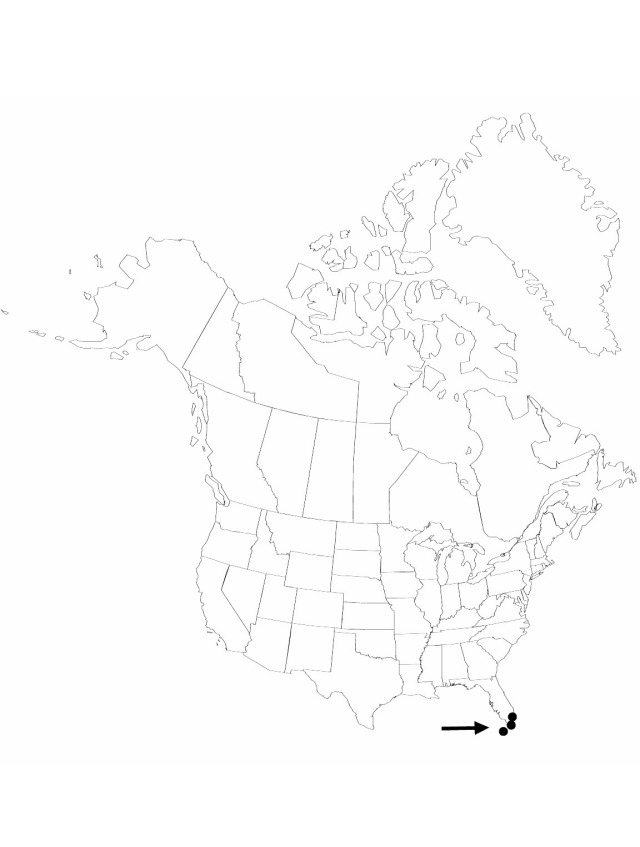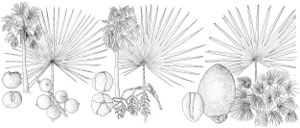Difference between revisions of "Coccothrinax argentata"
Gentes Herb. 4: 223. 1939.
FNA>Volume Importer |
imported>Volume Importer |
||
| (6 intermediate revisions by 2 users not shown) | |||
| Line 8: | Line 8: | ||
}} | }} | ||
|common_names=Silver palm | |common_names=Silver palm | ||
| − | |basionyms={{Treatment/ID/ | + | |special_status={{Treatment/ID/Special_status |
| + | |code=F | ||
| + | |label=Illustrated | ||
| + | }} | ||
| + | |basionyms={{Treatment/ID/Basionym | ||
|name=Palma argentata | |name=Palma argentata | ||
|authority=Jacquin | |authority=Jacquin | ||
| + | |rank=species | ||
| + | |publication_title=Fragm. Bot., | ||
| + | |publication_place=39, plate 43, fig. 1. 1801 | ||
}} | }} | ||
|synonyms={{Treatment/ID/Synonym | |synonyms={{Treatment/ID/Synonym | ||
|name=Coccothrinax garberi | |name=Coccothrinax garberi | ||
|authority=(Chapman) Sargent | |authority=(Chapman) Sargent | ||
| − | }}{{Treatment/ID/Synonym | + | |rank=species |
| + | }} {{Treatment/ID/Synonym | ||
|name=Coccothrinax jucunda | |name=Coccothrinax jucunda | ||
|authority=Sargent | |authority=Sargent | ||
| − | }}{{Treatment/ID/Synonym | + | |rank=species |
| + | }} {{Treatment/ID/Synonym | ||
|name=Thrinax argentea var. garberi | |name=Thrinax argentea var. garberi | ||
|authority=(Chapman) Chapman | |authority=(Chapman) Chapman | ||
| − | }}{{Treatment/ID/Synonym | + | |rank=variety |
| + | }} {{Treatment/ID/Synonym | ||
|name=Thrinax garberi | |name=Thrinax garberi | ||
|authority=Chapman | |authority=Chapman | ||
| + | |rank=species | ||
}} | }} | ||
|hierarchy=Arecaceae;Arecaceae subfam. Coryphoideae;Arecaceae tribe Corypheae;Arecaceae (tribe Corypheae) subtribe Thrinacinae;Coccothrinax;Coccothrinax argentata | |hierarchy=Arecaceae;Arecaceae subfam. Coryphoideae;Arecaceae tribe Corypheae;Arecaceae (tribe Corypheae) subtribe Thrinacinae;Coccothrinax;Coccothrinax argentata | ||
| Line 40: | Line 51: | ||
|distribution=Fla.;West Indies (Bahama Islands). | |distribution=Fla.;West Indies (Bahama Islands). | ||
|discussion=<p>Palms of this species from Dade and Broward counties, Florida, are typically smaller in stature than those from the Florida Keys. It is not known if this dwarfism is purely the result of edaphic conditions or if it is a genetic trait.</p><!-- | |discussion=<p>Palms of this species from Dade and Broward counties, Florida, are typically smaller in stature than those from the Florida Keys. It is not known if this dwarfism is purely the result of edaphic conditions or if it is a genetic trait.</p><!-- | ||
| − | --><p>Coccothrinax argentata is found in the Florida Keys and extreme southern Florida as far north as the vicinity of Boca Raton, Palm Beach County. It also occurs in the Bahamas. It is usually a small, single-trunked palm but occasionally develops multiple stems. It is most easily distinguished from Thrinax morrisii, with which it is sometimes confused in Florida, by the obscure transverse venation in the leaves and the purple-black fruits on long pedicels (versus conspicuous transverse venation and white fruits on short pedicels in T. morrisii).</p><!-- | + | --><p><i>Coccothrinax argentata</i> is found in the Florida Keys and extreme southern Florida as far north as the vicinity of Boca Raton, Palm Beach County. It also occurs in the Bahamas. It is usually a small, single-trunked palm but occasionally develops multiple stems. It is most easily distinguished from <i>Thrinax morrisii</i>, with which it is sometimes confused in Florida, by the obscure transverse venation in the leaves and the purple-black fruits on long pedicels (versus conspicuous transverse venation and white fruits on short pedicels in <i>T. morrisii</i>).</p><!-- |
| − | --><p>This species has been reported (C. E. Nauman 1990) to produce sterile natural hybrids with Thrinax morrissii in the Florida Keys where the two species are sympatric.</p> | + | --><p>This species has been reported (C. E. Nauman 1990) to produce sterile natural hybrids with <i>Thrinax</i> morrissii in the Florida Keys where the two species are sympatric.</p> |
|tables= | |tables= | ||
|references= | |references= | ||
| Line 50: | Line 61: | ||
-->{{#Taxon: | -->{{#Taxon: | ||
name=Coccothrinax argentata | name=Coccothrinax argentata | ||
| − | |||
|authority=(Jacquin) L. H. Bailey | |authority=(Jacquin) L. H. Bailey | ||
|rank=species | |rank=species | ||
| Line 64: | Line 74: | ||
|publication title=Gentes Herb. | |publication title=Gentes Herb. | ||
|publication year=1939 | |publication year=1939 | ||
| − | |special status= | + | |special status=Illustrated |
| − | |source xml=https:// | + | |source xml=https://bitbucket.org/aafc-mbb/fna-data-curation/src/2e0870ddd59836b60bcf96646a41e87ea5a5943a/coarse_grained_fna_xml/V22/V22_259.xml |
|subfamily=Arecaceae subfam. Coryphoideae | |subfamily=Arecaceae subfam. Coryphoideae | ||
|tribe=Arecaceae tribe Corypheae | |tribe=Arecaceae tribe Corypheae | ||
Latest revision as of 20:30, 5 November 2020
Stems generally solitary, 0–3 m, occasionally with vegetative sprouts forming on trunk. Leaves less than 1 m wide; segments silvery abaxially, stiff or lax. Inflorescences compact, not exceeding leaves; rachillae stiff; pedicels conspicuous. Fruits dark purple-black, globose, 6.5–12 mm diam. 2n = 36.
Phenology: Flowering spring–fall.
Habitat: Rocky, calcareous soil of coastal hammocks and scrub
Elevation: 0–10 m
Distribution

Fla., West Indies (Bahama Islands).
Discussion
Palms of this species from Dade and Broward counties, Florida, are typically smaller in stature than those from the Florida Keys. It is not known if this dwarfism is purely the result of edaphic conditions or if it is a genetic trait.
Coccothrinax argentata is found in the Florida Keys and extreme southern Florida as far north as the vicinity of Boca Raton, Palm Beach County. It also occurs in the Bahamas. It is usually a small, single-trunked palm but occasionally develops multiple stems. It is most easily distinguished from Thrinax morrisii, with which it is sometimes confused in Florida, by the obscure transverse venation in the leaves and the purple-black fruits on long pedicels (versus conspicuous transverse venation and white fruits on short pedicels in T. morrisii).
This species has been reported (C. E. Nauman 1990) to produce sterile natural hybrids with Thrinax morrissii in the Florida Keys where the two species are sympatric.
Selected References
None.
